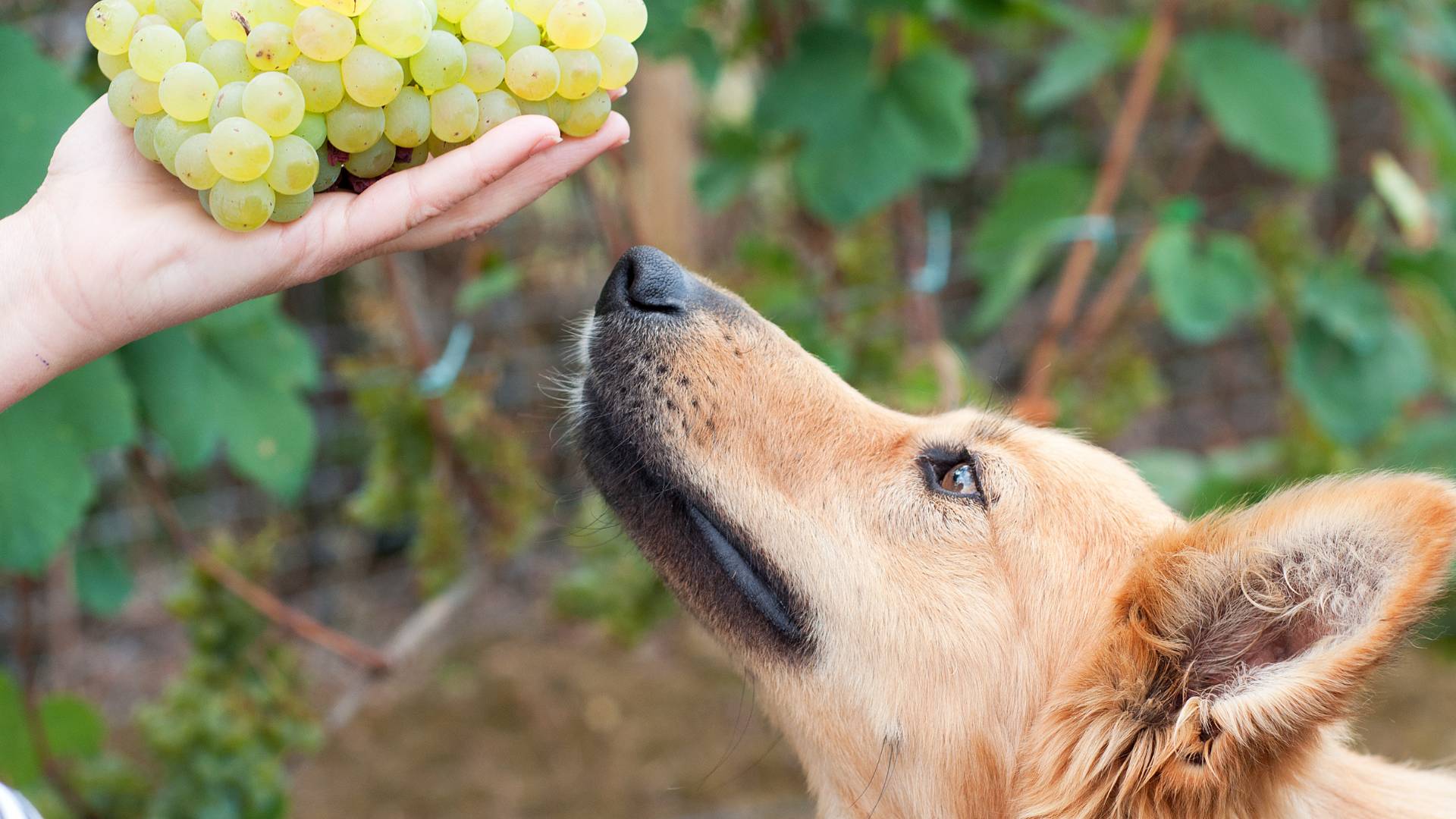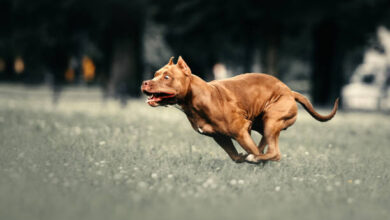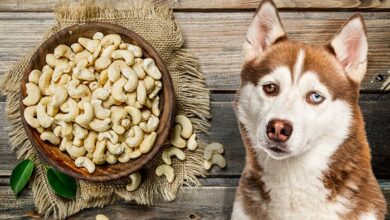Can Dogs Eat Grapes? Expert Advice in 2024

Can Dogs Eat Grapes? The answer is no, grapes are dangerous for dogs. Grapes are toxic and can lead to severe health problems. It doesn’t matter if they’re green, red, or black—none of them are safe for your pet.
Even a small amount of grapes can be harmful, so it’s important to keep them out of reach. To ensure your dog’s safety, stick to treats that are known to be safe and healthy for dogs. So let’s join us as we will briefly explore that – Can Dogs Eat Grapes or not?
Why Grapes Are Harmful to Dogs-Can Dogs Eat Grapes?
Can Dogs Eat Grapes? No, they can’t. Grapes are harmful to dogs for several reasons, and understanding these risks can help prevent accidental ingestion. Here’s why grapes pose a significant threat to canine health.
The Toxic Substance in Grapes Remains Unidentified, Making the Risk Unpredictable:
- Unknown Toxin: Scientists have yet to pinpoint the exact toxic compound in grapes that affects dogs. This uncertainty makes it difficult to predict which dogs might react or how severe the reaction might be.
- Unpredictable Risk: Because the specific toxin is unknown, the risk associated with grape ingestion can vary widely among individual dogs, making all grapes dangerous.
Grapes Can Cause Acute Kidney Failure, Which Can Be Life-Threatening:
- Kidney Damage: Consumption of grapes can lead to acute kidney failure, a severe condition where the kidneys lose their ability to filter toxins from the blood. This can result in a buildup of harmful substances and disrupt bodily functions.
- Potentially Fatal: Acute kidney failure from grape toxicity can be life-threatening, making early detection and treatment crucial for preventing severe health outcomes.
Some Dogs May Be More Susceptible to Grape Toxicity Than Others:
- Variable Sensitivity: Not all dogs react the same way to grape ingestion. Factors such as size, breed, and individual health can influence how a dog responds to grape toxicity.
- Higher Risk for Certain Dogs: Some dogs may experience severe reactions from even small amounts of grapes, while others may show symptoms from larger quantities.
Additional Considerations
- Immediate Action: If you suspect your dog has ingested grapes, seek veterinary care immediately to address potential toxicity.
- Preventative Measures: Avoid giving your dog grapes or foods containing grapes to eliminate the risk of toxicity.
Can dogs eat grapes? No, and understanding why grapes are harmful helps in preventing accidental ingestion. The unidentified toxic substance, potential for acute kidney failure, and varying susceptibility among dogs make grapes a significant health risk. Always keep grapes out of your dog’s reach and consult your vet if ingestion occurs.
Symptoms of Grape Toxicity in Dogs
Can Dogs Eat Grapes? No, they can’t. If your dog eats grapes, it’s essential to recognize the symptoms of grape toxicity promptly. Here’s what to watch for if your dog has ingested grapes and is showing signs of poisoning.
Initial Symptoms Include Vomiting, Diarrhea, and Excessive Drooling:
- Vomiting: Often the first sign of grape toxicity, vomiting occurs as your dog’s body tries to expel the harmful substances. This can happen within hours of ingestion.
- Diarrhea: Alongside vomiting, diarrhea is a common symptom and can lead to dehydration if not managed.
- Excessive Drooling: Increased drooling may accompany vomiting and is a sign of gastrointestinal distress.
Lethargy, Loss of Appetite, and Abdominal Pain May Follow:
- Lethargy: Your dog may become unusually tired or weak. They may seem less active or show a lack of interest in usual activities.
- Loss of Appetite: Affected dogs often refuse food or show diminished interest in eating, which can be a sign of nausea or discomfort.
- Abdominal Pain: Watch for signs of abdominal discomfort, such as whining, a hunched posture, or reluctance to move.
In Severe Cases, Dogs May Develop Decreased Urination and Kidney Failure:
- Decreased Urination: A significant reduction in urination can indicate kidney damage. It’s a serious symptom that requires immediate veterinary attention.
- Kidney Failure: Severe cases of grape toxicity can lead to kidney failure, where the kidneys lose their ability to function properly. Symptoms include severe dehydration, lethargy, and a lack of urination.
Additional Steps
- Seek Veterinary Care: If you notice any of these symptoms, contact your veterinarian immediately. Early treatment is crucial for managing grape toxicity and preventing severe outcomes.
- Monitor Closely: Keep a close eye on your dog’s condition and report any changes to your vet for a comprehensive evaluation and treatment plan.
Can dogs eat grapes? No, and recognizing symptoms of grape toxicity—such as vomiting, diarrhea, lethargy, and decreased urination—is key to ensuring prompt treatment. If your dog shows any signs of poisoning, seek veterinary care immediately to address the health risks effectively.
What to Do If Your Dog Eats Grapes
Can Dogs Eat Grapes? No, they can’t. If your dog consumes grapes, it’s crucial to act quickly to mitigate the risks. Here’s what you should do to ensure your dog receives the appropriate care:
Contact Your Veterinarian Immediately for Guidance:
- Seek Professional Help: Call your veterinarian or an emergency animal clinic as soon as you realize your dog has eaten grapes. Provide details about the quantity consumed, your dog’s size, and any symptoms they are showing.
- Follow Instructions: Your vet will give you specific instructions based on your dog’s condition and the amount of grapes ingested. They may recommend bringing your dog in for an evaluation.
Do Not Attempt to Treat Your Dog at Home Without Professional Advice:
- Avoid Home Remedies: Refrain from using home remedies or over-the-counter treatments unless instructed by a veterinarian. Some treatments could exacerbate the situation or cause additional harm.
- Professional Treatment: Your vet is equipped to provide the safest and most effective treatment options, including possible induced vomiting, activated charcoal, or supportive care.
Rapid Veterinary Care Can Be Critical in Preventing Serious Outcomes:
- Timely Intervention: The sooner you get veterinary care, the better the chances of preventing severe complications such as kidney failure. Early intervention can significantly impact the outcome and recovery.
- Monitor and Report: Keep a close watch on your dog’s condition and report any changes or new symptoms to your vet immediately.
Additional Tips
- Prepare for the Vet Visit: If possible, provide any packaging or details about the grapes consumed to aid in the treatment process.
- Prevent Future Incidents: Take steps to ensure grapes and other harmful foods are kept out of reach to avoid similar emergencies in the future.
Can dogs eat grapes? No, and if your dog eats grapes, immediate action is essential. Contact your veterinarian for guidance, avoid home treatments, and seek rapid professional care to prevent serious health issues.
The Increased Risk from Raisins and Grape Products
Can Dogs Eat Grapes? No, they can’t. The risk is even greater with raisins and grape products. Here’s why raisins and related foods are particularly hazardous for dogs and how to manage these risks.
Raisins, as Dried Grapes, Are More Concentrated and Pose a Higher Risk:
- Higher Toxicity: Raisins are dried grapes, which means they have a higher concentration of the toxic substances found in grapes. This makes them even more dangerous for dogs.
- Increased Risk: Even a small amount of raisins can lead to severe health issues, including acute kidney failure, due to their concentrated nature.
Foods Containing Raisins, Like Cookies or Bread, Should Also Be Avoided:
- Hidden Hazards: Many human foods, such as cookies, bread, and trail mixes, may contain raisins or grape products. These should be kept out of reach to prevent accidental ingestion.
- Potential Toxicity: The risks extend beyond raisins alone; any food containing raisins or grapes can be harmful if ingested by dogs.
Always Check Food Labels for Hidden Grape or Raisin Ingredients:
- Ingredient Awareness: Read ingredient labels carefully on all packaged foods. Grapes and raisins can appear in many products, so vigilance is key.
- Safe Alternatives: Opt for dog-friendly treats and snacks that are free from grapes, raisins, and other potentially harmful ingredients.
Additional Precautions
- Secure Storage: Store all grape and raisin products in secure places that your dog cannot access.
- Educate Others: Make sure family members and guests are aware of the dangers associated with grapes and raisins, especially during social events or when offering food.
So, Can dogs eat grapes? No, and the risk is even higher with raisins and grape products. Raisins are more concentrated and dangerous, and foods containing them should be avoided. Always check food labels and store these items securely to keep your dog safe.
Safe and Healthy Treat Alternatives for Dogs
Can Dogs Eat Grapes? No, they can’t. Grapes and raisins are hazardous to dogs, but there are plenty of safe and healthy treat alternatives to keep your pet happy and healthy. Here’s a guide to providing dog-friendly treats that are both enjoyable and nutritious.
Offer Safe Fruits Like Apples (Without Seeds), Blueberries, or Bananas:
- Apples: Remove the seeds and core before giving apples to your dog. Apples are a good source of vitamins and fiber.
- Blueberries: These are rich in antioxidants and make a great low-calorie treat for dogs.
- Bananas: In moderation, bananas are a good source of potassium and vitamins. Just avoid overfeeding, as they are high in sugar.
Choose Dog-Specific Treats That Are Formulated for Canine Health:
- Commercial Dog Treats: Opt for treats specifically designed for dogs. These are formulated to meet canine nutritional needs and are generally safe.
- Healthy Ingredients: Look for treats made from natural ingredients without artificial additives or harmful substances.
Introduce Any New Foods Gradually to Ensure They Agree with Your Dog’s Digestive System:
- Gradual Introduction: When adding new treats or fruits to your dog’s diet, start with small amounts to monitor for any adverse reactions.
- Observe Reactions: Watch for any signs of digestive upset or allergies, and adjust the diet accordingly. Consult your vet if any issues arise.
Additional Tips
- Balanced Diet: Ensure that treats are given in moderation and are balanced with your dog’s overall diet to avoid weight gain or nutritional imbalances.
- Consult Your Vet: For any dietary changes or if you’re unsure about certain foods, consult your veterinarian for personalized advice and recommendations.
In summary, can dogs eat grapes? No, but you can offer safe alternatives like apples (without seeds), blueberries, and bananas. Choosing dog-specific treats and introducing new foods gradually will help keep your dog’s diet both enjoyable and healthy.



